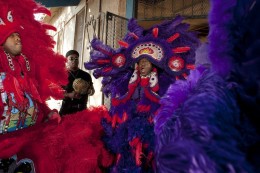Honey, Sweetie, Chief, Boss: How We Talk to Strangers
by Joshua Michtom

Yesterday, a woman I know complained on Twitter that a lady who worked at a grocery store had addressed her as “honey” and “sweetie,” and these things made her, my friend, really uncomfortable. In the tweet, she cc:ed the grocery chain, which replied, asking her to DM with more info. As my girlfriend sensibly pointed out, I should have minded my own goddamn business, but the idea of an employee getting in trouble for that — being a woman and calling another woman “honey” or “sweetie” — struck me as unjust, so I tried gently to suggest to my friend that maybe she was off base.
She countered that this particular instance felt weird, and I couldn’t know because I wasn’t there, and, well, she was right about that so I dropped the issue. But it got me to thinking about the language we use to address strangers and the effect it has when we are serving them, when they are serving us, and when we are acting as commercial equals.
English is a grand, complex language, and the words we use to address strangers situate us in terms of class, race, and affinity. They start to define the kind of relationship we want to have with another person.
In my Brooklyn upbringing, I learned that while it was acceptable for men to address other men as “sir,” the formality of the word created a distance. It said, “you are from one class of people and I am from another.” “Chief” and “boss,” on the other hand, seemed to say, “I am serving you right now, but maybe tomorrow, you will be serving me.” Thus, when I buy a cup of coffee from a guy, he hands it to me and says, “Here you go, Chief,” and I say, “Thanks, boss,” and we have established an equal footing.
Of course, context and identity are everything. Before moving from New York to Boston, I had never heard a white person call another white person “brother.” It struck me as weird and I won’t do it. White guys from Southie, meanwhile, call each other “brotha” routinely. I also wouldn’t think of calling a woman I don’t know “hon” or “sweetie,” but it doesn’t bother me in the slightest when a woman I don’t know addresses me that way.
In both instances, this is a recognition of real social dynamics: when a member of a historically oppressed minority implies a blood relationship with another member of that group, there is a sense of shared struggle and solidarity (see, also, the black head nod). But when two unrelated members of a racial majority presume non-existent kinship, the implications can feel a little sinister. Just so, a man calling a woman he doesn’t know by a diminutive term of affection — honey, baby, etc. — is an allusion to a longstanding, unjust imbalance of power and, by implication, an assertion of superiority. But a woman calling a man that, or another woman? It’s certainly informal, but I can’t see how it invokes oppression or derogates the person being addressed.
I am learning, though, that the world is big and opinions vary. In the course of discussing my friend’s umbrage at being called “hon,” I found out that someone else I know hates being called “chief” or “boss.” That turned my world upside-down, because I love “chief,” “boss,” and any other inaccurate honorific that anyone has ever called me. One of the drivers at a car service near where I used to live in Brooklyn always called me “mi general,” which is how a soldier would address a general in Spanish. A family friend in Hartford, a woman my parents’ age, inexplicably calls me “Comandante.”
So, dear readers, I ask you: what rules govern your linguistic interactions with strangers? How do these rules vary based on the circumstances? That is, you might call a man you don’t know “chief,” but when that man is a judge and you are the defendant, you should probably go with “Your Honor.” And what rules do you expect strangers who address you to follow? What would be offensive enough for you to complain to someone’s boss?
While contemplating these weighty matters, enjoy Professor Longhair singing the classic tune “Big Chief,” which, in addition to containing the word “chief,” alludes to the longstanding tradition black New Orleanians dressing up as Native Americans, affects the imagined poor English grammar of Native Americans, and includes the word “squaw.” It is a veritable grand slam of culturally complex linguistic signifiers.
Editor’s etymology note: Fun fact! White Americans began using the word “boss” (which is Dutch for “master”) early on to differentiate themselves from slaves.
Support The Billfold
The Billfold continues to exist thanks to support from our readers. Help us continue to do our work by making a monthly pledge on Patreon or a one-time-only contribution through PayPal.
Comments